
Rescue workers look for survivors trapped in a collapsed building after a huge earthquake struck in the city of Manta. Picture: AFP / API / ARIEL OCHOA
RESCUERS in Ecuador are desperately searching for survivors of a powerful earthquake that has killed at least 413.
Three people have so far been pulled out alive after being trapped for more than 32 hours in the rubble of a shopping center that was flattened by the quake.
President Rafael Correa, who cut short a trip to the Vatican, landed back in the country close to the disaster zone to inspect the devastation.
He has declared a state of emergency and said the priority is finding survivors.
He urged Ecuadoreans to stay strong.

Police officers pile empty coffins in one of Ecuador's worst-hit towns, Pedernales. Picture: AFP/ RODRIGO BUENDIASource:AFP
“Everything can be rebuilt, but what can’t be rebuilt are human lives, and that’s the most painful,” he said in a telephone call to state TV.
Survivors found
Televised images of the dramatic pre-dawn rescue of three people gave Ecuadoreans hope that scores of people still unaccounted for may yet be found.
To reach the survivors amid the debris in Manta, firefighters cut a nearly 70-centimeter hole in the concrete, through which they pulled a woman. A group of firefighters applauded as she emerged head first from the debris, disoriented, caked in dust and complaining of pain but otherwise in good health.
Later, at the same site, they managed to rescue another woman and a young man. All three were rushed in ambulances to a nearby hospital. Authorities said another woman remained trapped and was being given water and other supplies while rescuers attempt to remove a heavy concrete slab pinning down her legs.
Christian Rivera, the head of emergency services for the capital, Quito, said that depending on the circumstances a person without serious injuries can survive up to a week under the rubble. “After that, there’s a quick decline ... and the rescuers’ work becomes very difficult,” he said in an interview.
Tourists killed
State Department spokesman John Kirby hasn’t identified the dead American, but says US officials have been in touch with the victim’s family.
Kirby says the US will continue to work with Ecuadorean authorities to verify the welfare and whereabouts of all their citizens.
The area of pristine beaches hardest hit by the quake is popular with American tourists and expats.
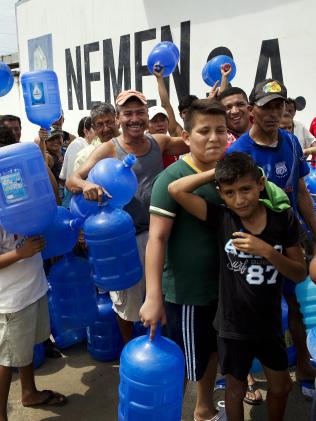
Residents stand in line as they wait to buy potable water in Manta, Ecuador. Picture: AP/Rodrigo AbdSource:AP
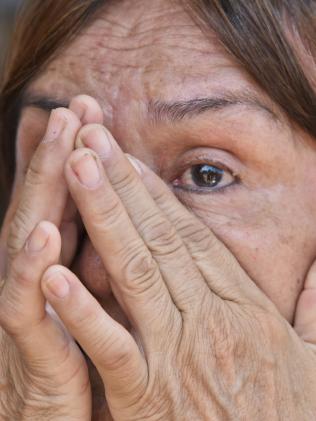
A woman cries as she waits for news of her loved ones in Manta, in the Ecuadorean coastal province of Manabi. Picture: AFP/LUIS ACOSTASource:AFP
Earlier, Canada said two of its citizens were killed and a relative confirmed that two members of a Quebec family were among the dead.
Guy Laflamme tells Montreal radio station 98.5 FM that his nephew’s wife, Jennifer Mawn, and their son, Arthur Laflamme, were among the hundreds reported dead after the roof of a residence collapsed on them.
Laflamme says his nephew, Pascal Laflamme, and his family had moved to Ecuador recently.
He said Monday Pascal had been chatting on FaceTime with his father in Quebec when the magnitude-7.8 earthquake hit Saturday night.
He said “Pascal shouted, ‘get out! get out!’ and all communication was cut off.” Mawn was a neuropsychiatrist who founded a clinic working with children and teens in Longueuil, south of Montreal.

Paramedics transfer an injured person to hospital who was pulled from the rubble. Picture: AP/Carlos SacotoSource:AP

Two boys cry as they find out that their sister has been killed in the earthquake. Picture: AP Photo/Dolores OchoaSource:AP
Worst quake in 40 years
Although the oil-producing South American nation frequently suffers seismic shudders because of its position on the Pacific Rim’s Ring of Fire, the quake — though it lasted just one minute — was the worst in nearly 40 years in Ecuador.
The US Geological Survey said the shallow quake was centred 27 kilometres south-southeast of Muisne, a sparsely populated area of fishing ports that is popular with tourists.
Some 200 aftershocks of lesser intensity have followed the quake.
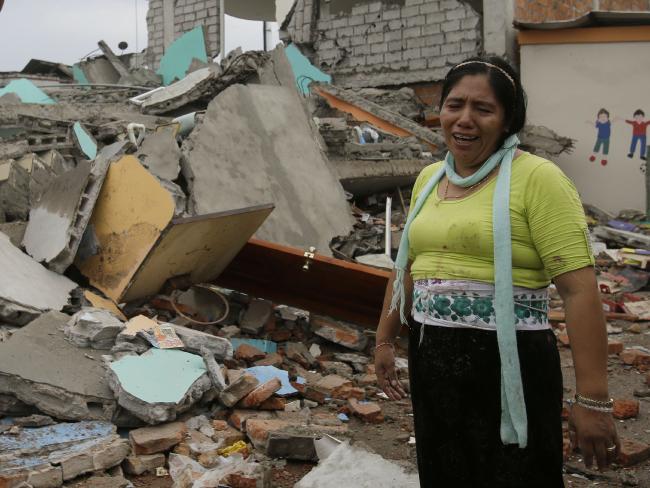
A woman cries as volunteers search for the body of her daughter amid the debris of a destroyed house in Pedernales, Ecuador. Picture: AP Photo/Dolores OchoaSource:AP
The disaster wrecked buildings, toppled power lines and sent terrified residents running from their homes when it struck a coastal zone popular with tourists.
Some 100 inmates in a prison in the western town of Portoviejo also managed to escape when the quake shook their facility, Justice Minister Ledy Zuniga tweeted.
About 30 of them had been recaptured, some had returned voluntarily and police were hunting for the others.
Elsewhere in hard-hit Portoviejo, the odour of decaying bodies started to fill the tropical air as rescuers raced to find survivors.
“We have already recovered three dead and we believe there are 10 to 11 people still trapped,” said one worker digging through the debris of what used to be a six-story hotel called El Gato.

People search for their belongings amid the debris of their destroyed homes. Picture: AP Photo/Dolores OchoaSource:AP

People take pictures of a collapsed bridge in Guayaquil, Ecuador, after a powerful earthquake hit the country. Picture: AFPSource:AFP
Officials have declared a state of emergency in six provinces and a national state of “exception,” both of which suspend certain civil rights and liberties to allow security forces and officials to react faster.
The worst hit areas
Among the worst-hit towns was Pedernales.
“Pedernales is devastated. Buildings have fallen down, especially hotels where there are lots of tourists staying. There are lots of dead bodies,” he told local media.
Soldiers patrolled the beach town, and the Red Cross and the army had set up a centre to treat the injured and receive bodies.
Ecuador’s Geophysical Office reported “considerable” structural damage as far away as Guayaquil, Ecuador’s biggest city with more than two million people, which is 350 kilometres (220 miles) away.
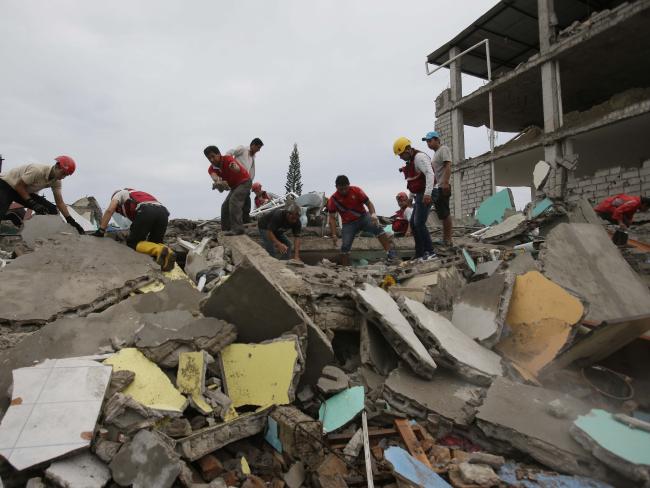
Volunteers search for survivors in the debris of buildings. Picture: AP Photo/Dolores OchoaSource:AP

A man walks amid the debris of buildings destroyed by an earthquake in Ecuador. Picture: AP Photo/Dolores OchoaSource:AP
In the town of Abdon Calderon, near Portoviejo, 73-year-old resident Nelly, who would not give her last name, told AFP in tears that she rushed into the street after the quake and saw that the covered market had collapsed.
“There was a person trapped who screamed for help, but then the screaming stopped. Oh, it was terrible,” she said.
Search for survivors
Rescuers scrambled through ruins in the provincial capital Portoviejo, digging with their hands trying to find survivors. “For god’s sake help me find my family,” pleaded Manuel Quijije, 27, standing next to a wrecked building. He said his older brother, Junior, was trapped under a pile of twisted steel and concrete with two relatives.
“We managed to see his arms and legs. They’re his, they’re buried, but the police kicked us out because they say there’s a risk the rest of the building will collapse,” Quijije said angrily as he looked on the ruins cordoned off by police. “We’re not afraid. We’re desperate. We want to pull out our family.”

People walk past a car squashed by rubble after the earthquake. Picture: AFP/Juan CevallosSource:AFP
Maria Torres, 60, fled her home along with other residents in the capital Quito.
“Oh, my God, it was the biggest and strongest earthquake I have felt in my whole life. It lasted a long time, and I was feeling dizzy,” Torres said.
“I couldn’t walk ... I wanted to run out into the street, but I couldn’t.”
Ecuador’s Vice-President Jorge Glas instructed residents on how to look for survivors.
“Compatriots: Unity, strength and prayer,” Glas said.
“We need to be quiet so we can hear. We can’t use heavy machinery because it can be very tragic for those who are injured.”
Towns turned to rubble
On social media residents shared photos of homes collapsed, the roof of a shopping centre coming apart and supermarket shelves shaking violently. In Manta, the airport was closed after the control tower collapsed, injuring an air force official. Guayaquil’s international airport was also closed because of a lack of communications.
Hydro-electric dams and oil pipelines in the OPEC-member nation were shut down as a precautionary measure.

A man carries belongings out of his damaged house in Pedernales, Ecuador. Picture: AP Photo/Dolores OchoaSource:AP
In the capital, the quake was felt for about 40 seconds and people fled to the streets in fear. Quito is located high in the Andes about 170 kilometres from the quake’s epicentre. The quake knocked out electricity and cellphone coverage in several neighbourhoods in the capital.
“I’m in a state of panic,” said Zoila Villena, one of many Quito residents who congregated in the streets. “My building moved a lot and things fell to the floor. Lots of neighbours were screaming and kids crying.”
Cristina Duran, 45, grabbed her three pets and stood under a large doorway to avoid shards of glass falling from shattered windows.
“I was frightened. And I just kept asking for it to be over,” she told AFP.
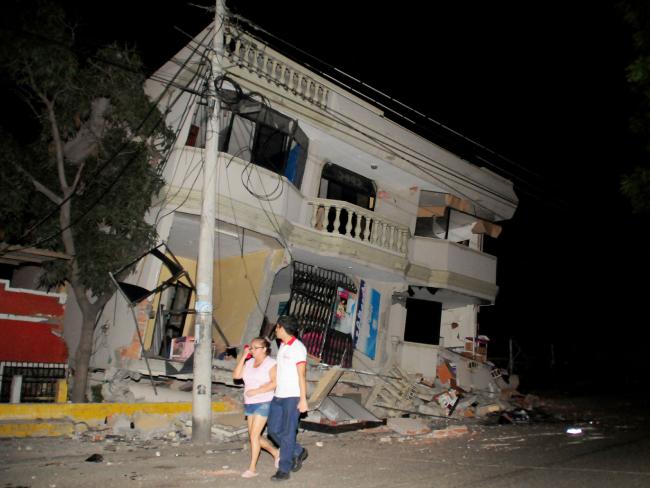
Residents walk on a street amid destroyed buildings following the 7.8-magnitude earthquake that struck northwestern Ecuador. Picture: AFPSource:AFP

Residents look for their lost belongings. Picture: AFP/Juan CevallosSource:AFP
Japan and Ecuador quakes linked
The quake comes on the heels of two deadly earthquakes across the Pacific, in the southernmost of Japan’s four main islands. A magnitude-6.5 earthquake struck Thursday near Kumamoto, followed by a magnitude-7.3 earthquake just 28 hours later. The quakes there have killed 41 people and injured about 1500, flattened houses and triggered major landslides.
Experts said Ecuador’s earthquake is about six times stronger and has released more energy than the one in Japan.
David Rothery, a professor of planetary geosciences at The Open University, northeast of London, says the total energy released by the magnitude-7.8 quake Saturday in Ecuador was “probably about 20 times greater” than the magnitude-7.0 quake in Japan on Friday. Rothery told The Associated Press overnight that bigger quakes last longer, so both the strength of the shaking and the duration contribute to the total energy.

Men sit amid the debris of their destroyed home. Picture: AP Photo/Dolores OchoaSource:AP
Rothery says the quake in Ecuador began deeper underground than the recent Japan quakes, which would have lessened the shaking on the ground. But the greater loss of life and greater damage in Ecuador can be attributed to the country’s less stringent construction codes.
The scientist also says “there is no causal relationship between the earthquakes in Ecuador and Japan.”
Aid flows in
Mexico has sent 120 helpers, Spain sent 80 rescue experts and Chile sent 49 firefighters. Missions have also arrived from Peru, Cuba, Bolivia, Venezuela, and Switzerland.
Secretary of State John Kerry says the U.S. will help in any way possible.
International aid groups have dispatched doctors and psychologists, and dogs trained to search for survivors. Workers are also setting up plants to clean drinking water.
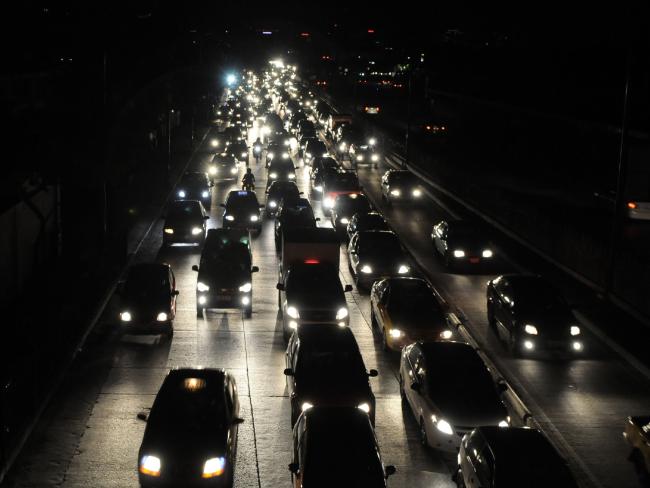
Motorists drive in the dark after the failure of electrical services the wake of the earthquake. Picture: AFPSource:AFP
Meanwhile, Pope Francis has offered prayers for those affected by the earthquake “that caused numerous victims and great damage.”
Francis asked the faithful in St. Peter’s Square overnight to pray for those suffering in the aftermath of the magnitude-7.8 earthquake, as well as those hit by a separate magnitude-7.3 tremor in Japan on Friday.
“May the help of God and of neighbours give them strength and support,” he said.
Why Can't We Predict Earthquakes?51:54

Horizon finds out the reasons why earthquakes remain so difficult to predict.







